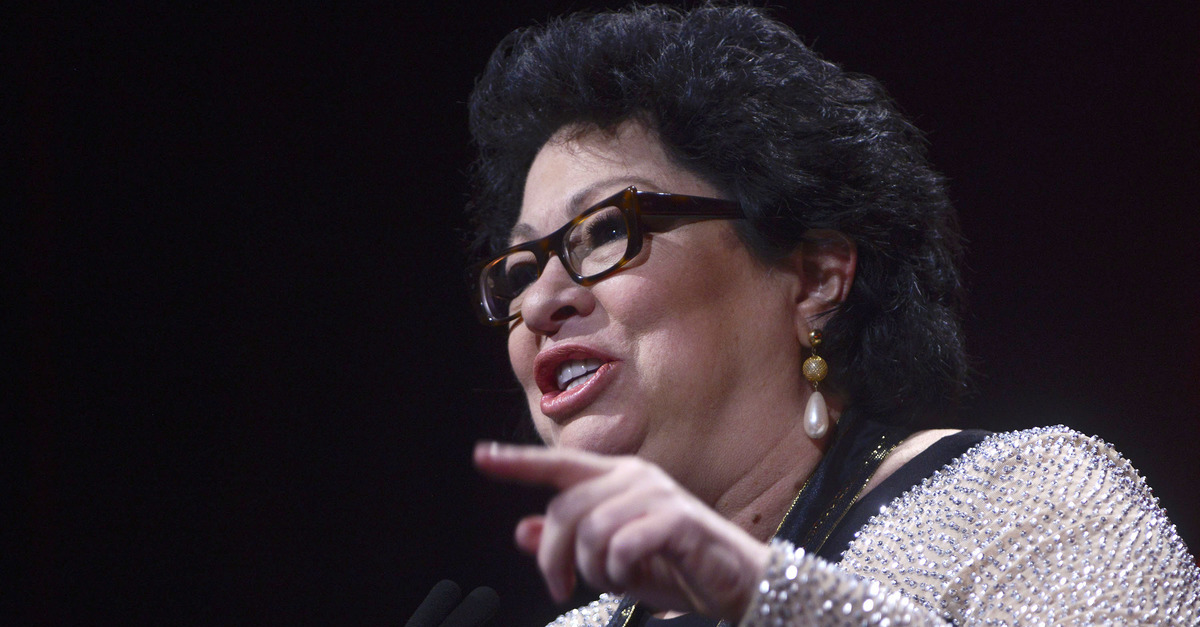
Justice Sonia Sotomayor dissented from the Supreme Court’s denial of certiorari on Monday in a case about severely divided loyalties premised on an ineffective assistance of counsel claim. The case centered on an attorney representing four criminal defendants initially prepared to go to trial together. At the last minute, however, two of the defendants took plea deals in exchange for testifying against the other two–but they were forced to keep the same shared attorney.
In the case, James Dale Holcombe and his father were, in the end, sentenced to 10 years in prison and 55 months in prison, respectively, over their convictions in a racketeering and conspiracy to commit racketeering scheme involving cash-for-gift cards.
According to Sotomayor, the judge in the case warned the defendants they were in “dangerous territory” and cautioned them on the risks of joint representation during a pretrial hearing. Each of the defendants signed a waiver after discussing the situation with counsel. Near the end of that hearing, the defense attorney at issue told the trial judge that “if there becomes a conflict I will have to withdraw.”
The attorney’s statement proved to be prescient.
“As trial approached, however, the nature of the conflict shifted,” Sotomayor explains. “During another pretrial hearing, defense counsel informed the trial court that two of Holcombe’s codefendants had entered pleas. Soon thereafter, the prosecution decided to call them as witnesses against Holcombe and Dale at trial. All four of the codefendants were still represented by the same counsel.”
Before jury selection, the prosecutor expressed opposition to the defense attorney still representing all four clients, telling the trial judge that “circumstances changed” in the case. She said the two plea deals had created a “greater conflict that . . . is not waiveable” because the two non-Holcombe defendants’ sentencing depended on the quality of their testimony against the Holcombes, specifically how “cooperative” they were ultimately deemed to be.
At the same time, the prosecutor noted, the defense attorney would have to cross-examine his “current clients” in order to give the Holcombes an adequate defense during their own trial.
“In other words, the shared attorney’s divided loyalties might result in a less-than-exhaustive cross-examination of the cooperating witnesses, to Holcombe’s and Dale’s detriment,” Sotomayor sums up.
During that hearing, following the prosecutor saying the arrangement couldn’t work, the defense attorney offered to withdraw but was cut off by the judge before he could finish his sentence.
Sotomayor offers the upshot:
Despite being made aware of this patent conflict, the trial judge did not question the remaining two defendants, encourage them to speak to an unconflicted attorney, or advise them that they had a right to separate representation. Instead, the court simply rejected defense counsel’s offer to withdraw, concluding that any conflict had been properly waived earlier in the proceedings, before the two codefendants accepted the plea deals and began cooperating with the prosecution. The trial proceeded; Holcombe’s two codefendants testified against him and Dale on behalf of the prosecution (and were cross-examined by their shared attorney); and Holcombe was convicted and sentenced…
The sentence was affirmed by an appeals court in Florida based on the idea that Holcombe had not shown an actual Sixth Amendment ineffective assistance of counsel violation based on the simultaneous representation alone. The defendant petitioned the nine justices–who turned down his request for review without an explanation.
Sotomayor argues the lower court erred by applying the wrong standard from case law and forcing Holcombe to bear “the additional burden of proving an adverse effect on his representation.”
“When a trial court is made aware of an actual conflict before trial and fails to inquire into the nature and scope of the conflict, reversal of a defendant’s conviction is automatic,” Sotomayor argues, citing precedent from a 2002 high court opinion. “In this case, the trial court properly discharged its obligation at the outset of proceedings, but failed to fulfill its renewed obligation after an actual conflict arose.”
While lauding the trial court’s initial interrogation of the joint defense agreement, Sotomayor says the judge summarily failed by declining to reassess the situation after an actual conflict was identified.
From the dissent, at length:
Here, the prosecutor unequivocally identified an actual conflict, different in kind from the potential conflict the trial court had previously considered, by explaining that Holcombe’s codefendants’ decisions to testify against him created an unwaivable conflict. Her concerns were well founded. The codefendants’ pleas put defense counsel in an impossible dilemma: If the attorney successfully undermined the codefendants’ testimony, he would aid Holcombe’s defense, but potentially jeopardize the codefendants’ ability to obtain lenient sentences. Holding back against the codefendants, on the other hand, would improve their chances at sentencing, but allow the State’s key witnesses to provide damning evidence against Holcombe.
“Once notified of this conflict, the trial court had an obligation to inquire further into its nature and extent,” Sotomayor continues. “At minimum, given that the potential conflict had matured into an actual conflict, the court should have taken the precaution of advising the defendants to confer again with unconflicted counsel regarding the propriety of the representation and should have directly explained the serious dangers of continuing with an actually conflicted attorney. Because it did not, reversal of Holcombe’s conviction on appeal should have been automatic.”
In conclusion, the dissent argues the lower courts “failed to protect that core constitutional guarantee” of effective assistance of counsel as guaranteed by the Sixth Amendment.
“For these reasons, I would summarily reverse the judgment of the Florida Court of Appeal,” the justice said.
[Image via Leigh Vogel/Getty Images]